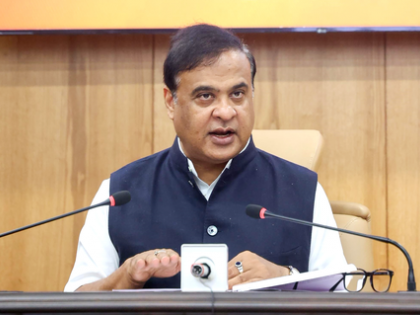No change in status of tribal belts and blocks in Assam: CM Sarma
By IANS | Updated: August 5, 2025 23:54 IST2025-08-05T23:45:38+5:302025-08-05T23:54:46+5:30
Guwahati, Aug 5 Assam Chief Minister Himanta Biswa Sarma, on Tuesday, reiterated that the status of the Sixth ...

No change in status of tribal belts and blocks in Assam: CM Sarma
Guwahati, Aug 5 Assam Chief Minister Himanta Biswa Sarma, on Tuesday, reiterated that the status of the Sixth Schedule areas, along with tribal belts and blocks in the state, will remain unchanged.
Addressing reporters, CM Sarma affirmed that these provisions have been in place since independence and will continue without alteration.
"There will be no change in the status of the Sixth Schedule areas as well as the tribal belts and blocks. These systems have existed since Independence, and there is no room for any controversy over them," he said.
The Chief Minister cited the example of the Tirap tribal belt, where the state government has facilitated land rights for indigenous communities.
Similar measures, he said, have also been implemented for the Moran and Motok communities after consultations with the Tribal Sangha, a religious organisation based in Guwahati.
"We have taken steps to grant land rights to indigenous people living in tribal belts and blocks, including areas like Balipara and Dhemaji. These actions were taken through dialogue and consultation, and the Tribal Sangha has not objected to our initiatives," CM Sarma added.
He emphasised that the state government remains committed to safeguarding the rights of indigenous communities through continued engagement and consensus-building.
Meanwhile, in a poignant tribute to a defining moment in Assam's history, CM Sarma, on Tuesday, announced that construction of a grand memorial dedicated to the martyrs of the Battle of Alabai is currently underway.
The monument will commemorate the 10,000 Ahom soldiers who laid down their lives on August 5, 1669, in a fierce battle against the Mughal forces near the Alabai Hills in Guwahati.
Calling the battle "one of the most important chapters in the history of Assam," the Chief Minister took to social media platform X to underline the state government's commitment to preserving the legacy of the Ahom dynasty, which ruled Assam for six centuries and fiercely resisted Mughal expansion.
"Our government has taken steps to build an Alabai memorial in tribute to the 10,000 martyrs, and the work on this monument is now in full swing," CM Sarma said.
"We will continue to focus on preserving and dignifying every chapter of Ahom history," he added.
The Battle of Alabai, though less widely chronicled in mainstream historical narratives, holds immense significance in the collective memory of Assamese people.
The proposed memorial is expected to serve not only as a site of remembrance but also as an educational landmark highlighting the region's valiant resistance to imperialist forces.
Disclaimer: This post has been auto-published from an agency feed without any modifications to the text and has not been reviewed by an editor
Open in app